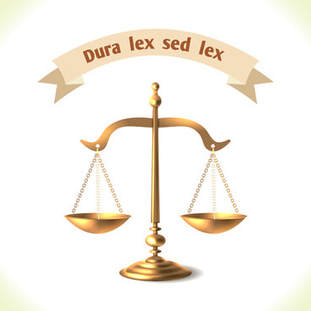There are industries and professions which are often heard of, are well known, and it is easily and commonly understood what generally goes on in them. It is clear that a teacher teaches, a builder builds, a translator translates and so on. With some, however, such as the translator, what the task entails and what the professional requirements are in order to be competent to perform the role are frequently misunderstood and underestimated.
Taking the further example of the legal profession, most people understand that a lawyer can advise on legal matters, ensure you gain compensation for a wrongdoing or that a wrongdoing is rectified, defend you in a courtroom, verify that legal documents, contracts etc are correctly and legally drafted, among other things.
It is therefore no surprise that the ordinary member of the public understands any role or task that includes the word “legal” or the term “legal document” to be directly associated with the legal profession.
To get to the bottom of this, let’s proceed with the comparison of two jurisdictions. Firstly, in parts of the USA such a person is understood to be someone who serves documents such as a court summons on members of the public and files documents with a court. In other parts of the country this is understood to be a type of legal support assistant, a bit like a legal secretary or similar assistant in the UK.
This person is expected to have finely tuned administrative and organisational skills. Examples of this include managing the firm’s filing systems, whether these are paper files, electronic ones or both and taking care that these are easily identifiable to others who may require access to them.
Excellent IT skills are clearly an advantage in organising the electronic files just mentioned but also to secure the safe storage of data within the office and manage the many other systems used there such as scheduling and calendar software, emails and other data recording applications.
Further skills the person will require include strong interpersonal skills with the ability to deal with both the legal professionals within the firm and from other firms, court and other staff. Quite likely this aptitude for communication is useful for dealing with suppliers, such as office stationery providers or travel companies, and competently processing invoices. The same can be said for the law firm’s clients with whom telephone and face-to-face communication is usually required. Dealing with client invoices and payments too can undoubtedly be tasks requiring much patience and tact!
An extremely important trait for the person employed in this role is naturally the highest standard of discretion and confidentiality in dealing with individuals from outside of the firm including clients. Any carelessness in this regard can easily lead to the disclosure of important information on which the success of a particular case entirely rests and result in a case being jeopardised. This circumstance would entail devastation for the client and needless to say the professional reputation of the legal professional under whose supervision the person had been working and potentially the firm as a whole.
Taking the further example of the legal profession, most people understand that a lawyer can advise on legal matters, ensure you gain compensation for a wrongdoing or that a wrongdoing is rectified, defend you in a courtroom, verify that legal documents, contracts etc are correctly and legally drafted, among other things.
It is therefore no surprise that the ordinary member of the public understands any role or task that includes the word “legal” or the term “legal document” to be directly associated with the legal profession.
To get to the bottom of this, let’s proceed with the comparison of two jurisdictions. Firstly, in parts of the USA such a person is understood to be someone who serves documents such as a court summons on members of the public and files documents with a court. In other parts of the country this is understood to be a type of legal support assistant, a bit like a legal secretary or similar assistant in the UK.
This person is expected to have finely tuned administrative and organisational skills. Examples of this include managing the firm’s filing systems, whether these are paper files, electronic ones or both and taking care that these are easily identifiable to others who may require access to them.
Excellent IT skills are clearly an advantage in organising the electronic files just mentioned but also to secure the safe storage of data within the office and manage the many other systems used there such as scheduling and calendar software, emails and other data recording applications.
Further skills the person will require include strong interpersonal skills with the ability to deal with both the legal professionals within the firm and from other firms, court and other staff. Quite likely this aptitude for communication is useful for dealing with suppliers, such as office stationery providers or travel companies, and competently processing invoices. The same can be said for the law firm’s clients with whom telephone and face-to-face communication is usually required. Dealing with client invoices and payments too can undoubtedly be tasks requiring much patience and tact!
An extremely important trait for the person employed in this role is naturally the highest standard of discretion and confidentiality in dealing with individuals from outside of the firm including clients. Any carelessness in this regard can easily lead to the disclosure of important information on which the success of a particular case entirely rests and result in a case being jeopardised. This circumstance would entail devastation for the client and needless to say the professional reputation of the legal professional under whose supervision the person had been working and potentially the firm as a whole.
Additional duties requiring the utmost attention to detail include checking, revising and proofreading all forms of written correspondence whether in hard copy or electronically and meticulous typing and data entry capabilities.
To many it is with these last three attributes, namely, confidentiality, attention to detail and accuracy that some overlap with the responsibilities of another type of legal document specialist is acknowledged. This is not to ignore the administrative, organisational and interpersonal skills mentioned further above, which are equally necessary and important. In the UK the presumption would be that reference is being made to someone who works in the legal profession. However, there is a profession that supports not only the latter sector but also provides such support services to official bodies, organisations, individuals and the commercial sector: that of the translator who is a legal document specialist and who, in most instances, is accredited by an appropriate institution to provide an official English translation for a plethora of purposes.
This type of translator must be capable of understanding legal terms and principles as well as the legal systems of the countries where the language or languages from which they translate are used in addition to that of the country whose official language is the one into which they translate, and which should be their native or first language.
It goes without saying, then, that in a world where pen is rarely put to paper particularly in formal, academic and professional settings, ease in using various forms of telecommunications technology, programmes and software is one of the first skills to be developed or honed. Similarly, dealing with clients can be a particular challenge and so, the ability to deal calmly, rationally and professionally is a desirable attribute in successfully managing a translation business.
As the term suggests, the translator who is a legal document specialist is at all times required to exercise the utmost discretion and confidentiality to an equal extent as the non-linguist counterpart. A careless utterance outside of the work environment would doubtlessly result in a reduction in work from the client whose information has been publicly disclosed. And worse, they would consider this language specialist a liability who cannot be trusted with their files. Such a lack of confidence in a language professional always bears the risk of their own professional reputation disappearing rapidly into the abyss.
The final skill set shared with the namesake, that essentially consists in diligence, accuracy and attention to detail, is the one that resonates most with those who give a thought for the role and responsibilities of the translator of legal documents. Obvious aspects of this are great care in performing the translation task, reference to glossaries and researching new terminology, careful input while typing, revision and proofreading of the completed work.
It is shown therefore that a legal document specialist is widely and correctly understood to be someone who is sufficiently qualified and competent to handle a variety of legal documents in the completion of their work. Both roles referred to require an excellent understanding of legal speak and the workings of the given legal system. Both require a high level of diligence be it in verbal or written communications as well as an ability to overcome the challenges of information technology.
The clear difference is that the non-linguist specialist processes documents and communications in a single language whereas the translator in fact transforms documents that originated in a given jurisdiction in a foreign language into the equivalent language of the jurisdiction and legal system in which they are based. An example in terms of the UK is taking a court judgment, a contract or personal document issued in a non-UK country and drafted in a language other than English and essentially transferring its original meaning into English and in appropriate terminology for the Scottish or English legal system.
Your feedback is welcome so please leave any comments below.
To many it is with these last three attributes, namely, confidentiality, attention to detail and accuracy that some overlap with the responsibilities of another type of legal document specialist is acknowledged. This is not to ignore the administrative, organisational and interpersonal skills mentioned further above, which are equally necessary and important. In the UK the presumption would be that reference is being made to someone who works in the legal profession. However, there is a profession that supports not only the latter sector but also provides such support services to official bodies, organisations, individuals and the commercial sector: that of the translator who is a legal document specialist and who, in most instances, is accredited by an appropriate institution to provide an official English translation for a plethora of purposes.
This type of translator must be capable of understanding legal terms and principles as well as the legal systems of the countries where the language or languages from which they translate are used in addition to that of the country whose official language is the one into which they translate, and which should be their native or first language.
It goes without saying, then, that in a world where pen is rarely put to paper particularly in formal, academic and professional settings, ease in using various forms of telecommunications technology, programmes and software is one of the first skills to be developed or honed. Similarly, dealing with clients can be a particular challenge and so, the ability to deal calmly, rationally and professionally is a desirable attribute in successfully managing a translation business.
As the term suggests, the translator who is a legal document specialist is at all times required to exercise the utmost discretion and confidentiality to an equal extent as the non-linguist counterpart. A careless utterance outside of the work environment would doubtlessly result in a reduction in work from the client whose information has been publicly disclosed. And worse, they would consider this language specialist a liability who cannot be trusted with their files. Such a lack of confidence in a language professional always bears the risk of their own professional reputation disappearing rapidly into the abyss.
The final skill set shared with the namesake, that essentially consists in diligence, accuracy and attention to detail, is the one that resonates most with those who give a thought for the role and responsibilities of the translator of legal documents. Obvious aspects of this are great care in performing the translation task, reference to glossaries and researching new terminology, careful input while typing, revision and proofreading of the completed work.
It is shown therefore that a legal document specialist is widely and correctly understood to be someone who is sufficiently qualified and competent to handle a variety of legal documents in the completion of their work. Both roles referred to require an excellent understanding of legal speak and the workings of the given legal system. Both require a high level of diligence be it in verbal or written communications as well as an ability to overcome the challenges of information technology.
The clear difference is that the non-linguist specialist processes documents and communications in a single language whereas the translator in fact transforms documents that originated in a given jurisdiction in a foreign language into the equivalent language of the jurisdiction and legal system in which they are based. An example in terms of the UK is taking a court judgment, a contract or personal document issued in a non-UK country and drafted in a language other than English and essentially transferring its original meaning into English and in appropriate terminology for the Scottish or English legal system.
Your feedback is welcome so please leave any comments below.




